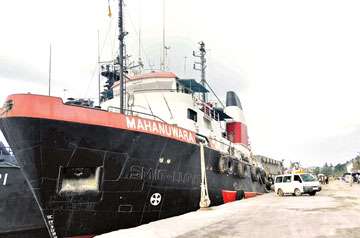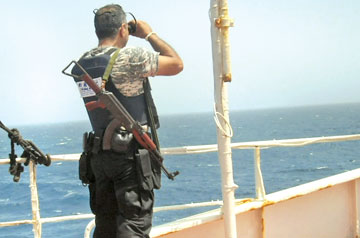Floating armouries: danger to national security?
by Dhaneshi Yatawara
 |
|
Courtesy : Avant Garde
Maritime Services website |
Armed maritime security has become a money spinner in today's pirate
plagued world. Private security firms that lead the trade are not only
powerful but also invincible. Though Sri Lanka is a key country along
the East West sea lane the trade remained new to the country until the
Police detected a floating warehouse of weapons that belonged to the
private company Avant Garde Maritime Services in the Galle Harbour in
January this year.
Investigations on the controversial floating armouries by the
Criminal Investigation Department is reaching its final stages. As the
day of reckoning gets close, the huge loss of foreign exchange to the
country and the illegal nature of the business will be brought to light
soon.
On an information that reached the Police Southern Range DIG office,
container loads of weapons and ammunition were recovered from seven
containers on the naval ship 'Mahanuwara' which was the floating
warehouse of the Avant Garde Maritime Services. The ship was in the
Galle Harbour. Investigations revealed that the armouries were operating
under the license issued by the Ministry of Defence.
 |
|
Courtesy : Dailynews |
The Avant Garde Maritime Services operates to date. "The CID is
currently conducting investigations to ascertain the legality of the
permit for the company to operate a floating armory," Police spokesman
ASP Ruwan Gunasekera said. Arms dealing is a lucrative business.
"However, since the company has obtained a permit there is nothing to
stop it from operating an amoury," Gunasekera said.
The weapons in the floating armoury belonged to Private and Maritime
Security Companies, according to the preliminary investigations and
statements made by the Avante Garde.
These weapons were stored in the armouries in the Navy camp in Galle
before Avante Garde entered into a joint venture with the Government
Owned Business Undertaking of the Rakna Arakshaka Lanka in 2012.
Before the Avant Garde Rakna Araksha Lanka joint venture, weapons
used by the Private and Maritime Security Companies for the security of
merchant vessels were stored in the Sri Lanka Navy's two armouries in
Colombo and Galle. Vessels plying the East West sea lane route would
stop over at Galle or Colombo to load in weapons from the Navy armouries
to be taken to their destinations.
Sri Lanka Navy has charged 1,000 US Dollars per movement and on an
average there had been 500 movements per month, according to a high
positioned retied naval officer.
The floating armoury was set up while the officer was in service.
Accordingly when it was handed over to Avant Garde the charge per
movement was raised to 3500 US Dollars and the number of movements were
increased between 750 to 800 a month.
Apparently, the Sri Lanka Navy has lost income due to the new
business venture. Whether the due charges are paid to Sri Lanka Navy for
these services is yet to be revealed.
Yet another question arises as to whether the Navy can carry out such
an operation?
The Galle Harbour is a well known service hub for ships that sail the
East-West shipping route. About 200 to 50 ships sail on this route which
is about 10-12 nautical miles off the Galle Harbour. Most of them are
large merchant vessels with cargo amounting to over billions of dollars.
 |
|
Courtesy: Maritime
Security Review |
A number of private services that operated from the Galle Harbour,
had dealings with these ships. They supplied not only spare parts, tools
such as ropes, lubricants but also fresh and canned food, water and
beverages.The Galle Harbour is the only service harbour in Sri Lanka
that operates beyond the Malacca Strait.
Piracy has been a threat to international shipping in the East and
West sea lane that lies South of Sri Lanka, being one of the busiest sea
routes.
It has a substantial international trade implication.
International Maritime Organisations requested the UN
Secretary-General Ban Ki-moon to raise the issue of Somali piracy at the
Security Council to compel the Somalian Transitional Federal Government
to address the issue.
Piracy is not only a threat to security but also economic stability
of countries.
Yemen, controlling the Southern entrance of the Red Sea and Egypt the
northern entrance via the Suez canal are affected by the problem.
Arab countries suffer a major loss. Since oil from Arabian countries
coming from the Persian Gulf must be transported to Europe and the US
via the Suez canal, any disturbance on the sea routes could pose a
serious security and economic threat to the world. |

